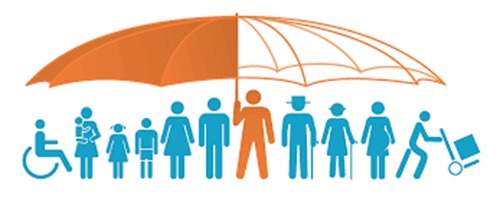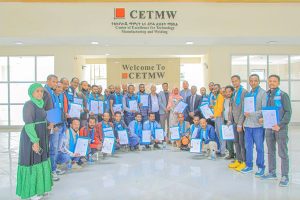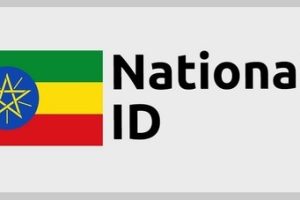
Over the past decades, the concept of social protection has gained recognition at the global level as it yields positive impacts on tackling poverty and ensuring growth at local and national levels.
Owing to its considerable role in ensuring inclusive and balanced growth, countries invest hugely and work decisively, encompassing social protection policy frameworks and strategies in their development program.
Ethiopia has also been working determinedly to reduce poverty, and lessen the social and economic vulnerability of citizens through formal and informal ways; making social protection part of its social policy framework. By devising social policy frameworks and strategies as well as developing working procedures, the country is endeavoring to ensure social growth and social well-being sustainably. As a result, the programs have produced positive income, and many people, the poor and vulnerable sections of society, have been able to benefit and improve their livelihood.
Initiatives such as urban and rural development safety net programs, school feeding, community-based health insurance plus legal counseling, and other programs are some areas that brought about encouraging outcomes.
Recently, at the experience-sharing program held between Ethiopia and South Sudan on social protection. Ethiopia shared its best experience in the implementation of social protection.
Speaking on the occasion, Women and Social Affairs Minister Ergogie Tesfaye said that social protection is a critical pillar of social policy designed to address the driver of risks and also vulnerabilities that individuals, families, and communities encounter in their lives.
In this regard, Ethiopia considers social protection as a core component of its national development, remaining at the center of public policy.
By mitigating risks at the different life stages, social protection programs contribute not only to individual securities but also to social cohesion acting as a bridge between citizens and government, she reflected.
“In Ethiopia, social protection is a priority for our government reflecting our dedication to safeguarding citizens during and beyond their working years. We also see social protection as an essential tool for sustaining peace and security at the local level by reinforcing social bonds and social contracts between people and government.”
The Ethiopian government has recognized and invested in social protection as a core component of national development in partnership with key stakeholders like the World Bank and others, she added.
Among the many initiatives designed and implemented by the government to promote inclusive growth, and reduce the level of poverty, the rural and urban safety net programs, community-based health insurance, school feeding programs, and active labor market interventions, were mentioned as productive interventions.
South Sudan Minister of Gender, Child and Social Welfare Aya Warile also said that safety net programs in the two countries are becoming increasingly important to address emerging vulnerabilities such as economic shocks, and climate variability.
Stating that safety net flagship program in South Sudan is in its third phase, she indicated that this phase is the productive safety net for the socio-economic opportunities project.
Praising Ethiopia for its effective safety net program, Warile stressed that at the end of the visit, they will draw important lessons to improve their programs across the countries.
This visit is the start of many cross-learning opportunities for both countries, the Minister emphasized.
World Bank Social Protection and Jobs Practice Manager for East Africa Region Robert Chase said that over the past years, the World Bank has deepened its commitment to supporting social protection around the world and in this region.
Mentioning that over the years Ethiopia has seen encouraging outcomes in its social protection programs and can be a model country, in this regard, the Manager said that Ethiopia has significant lessons for other countries; particularly for South Sudan.
Similarly, South Sudan has a vital experience to share with other countries including Ethiopia in using biometric means to identify beneficiaries, he added.
During the experience-sharing program, the officials from the two countries have exchanged ideas and experiences, on the spheres of shock-response, economic inclusion, and social inclusion.
Meanwhile, it was revealed that the activity of developing a digital system that enables accurately registering beneficiaries of social services in one database has been completed and it is being implemented at the pilot program level.
According to Women and Social Affairs State Minister Huria Ali, the digital system helps to record beneficiaries’ accurate information and ensures their fair benefits.
She also extended her gratitude to the World Bank for its budget support for urban and rural development safety net activities and other projects on behalf of the Ethiopian government and the beneficiaries.
She added that an effective and strong national social protection council will be established to manage, coordinate, and control the activities undertaken by each sector. Further, a plan is set to align the policy and strategy with the ever-increasing needs of citizens and expand access to social protection services.
Concurrent with the efforts exerted to build a reliable financial capacity for the successful implementation of the program, due emphasis will be given to job creation opportunities for low-income citizens.
“Information is wisdom, and having organized and real-time information plays an important role in ensuring fair use and crafting information-based policies.
Mentioning that the pilot program has already started with the registration of people residing on the street, she said the national ID has been able to provide support by giving a unique identification number to the registrants to avoid duplication of users.
The State Minister also thanked the governmental and non-governmental institutions involved in the development of the digital system.
Gender, Children, and Social Security Minister of South Sudan Aya Benjamin also stated regarding the visit that the delegation paid at the activities carried out under the urban development safety net programs in Harar, Hawassa, and Dire Dawa towns.
The delegation also reflected their opinion saying the government’s effort is an exemplary move. The establishment of a strong structural organization, community-based support alliance, and health insurance program, and the measures taken in lifting up, rehabilitating, and benefiting citizens, who were once left on the streets by allocating a large amount of budget to the sector, were mentioned as a good experience that they can draw lesson.
State Minister Huria Ali also explained Ethiopia’s social protection system in detail.
Social service beneficiaries’ registration system enables to have uniform and accurate information as a country to avoid duplication and ensure equal distribution of resources. It also helps to evaluate the performance and impact of social protection programs, identify areas for improvement, ensure the continuity of services established, and hold accountability, it was learned.
BY STAFF REPORTER
THE ETHIOPIAN HERALD TUESDAY 19 NOVEMBER 2024





